
"There ain't no such thing as a free lunch" is an age-old adage that economists use to communicate the idea that it is impossible to get something for nothing. However, this article talks of those cricketers who, in a way, defied this theory as they went on to win a World Cup medal without them having played a single match in the entire edition.
Having said that, one can not belittle the effort it takes to make it to the final squad that represents a country at the World Cup. However, getting to be crowned as a champion without actually contributing to the team's on-field victory can be termed as fortunate.
In the eleven editions of the ICC Cricket World Cup that have taken place thus far, barring the Australian squads of 1987, 1999 and 2015 led by Alan Border, Steve Waugh and Michael Clarke respectively, Imran Khan's 'Cornered Tigers' in 1992 and Mahendra Singh Dhoni's Indian team of 2011, every edition has seen one or more player of the Champion team who did not play a single match in his team's entire successful campaign.
1975
Collis King
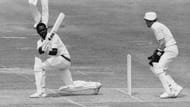
Right-handed middle order batsman Collis King was the only one who did not get to take the field in any of the five matches that the Windies played in the inaugural World Cup. However, he got an opportunity to contribute to the team's success in the 1979 edition and he did not fail to make a mark.
Having scored just 46 runs in the three matches before the final, King announced himself when it mattered the most as he joined hands with the legendary Sir Viv Richards to bail his team out of a spot as he bludgeoned his way to a 66 ball 86, tearing apart the English bowling attack.
With his assault, King not just ensured that the Windies were on the road of defending their title, but also overshadowed the enigmatic man on the other end who is termed to be the greatest to have graced the shorter version of the game.
Also read – World cup tied matches
1979
Larry Gomes, Faoud Bacchus and Malcolm Marshall
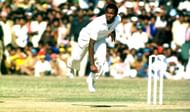
If only India had not done what was not expected of them in 1983, the triplet of West Indies' Larry Gomes, Faoud Bacchus and the devastating Malcolm Marshall could have told their children that they did not just win a World Cup medal without playing even a single match in an entire tournament.
The mighty force that the team from the Caribbean was in those days, they hardly faced any competition before steamrolling India, New Zealand and Pakistan on their way to the finals of 1979 where they went past hosts England to retain the title.
And thus they played an unchanged XI throughout the tournament, leaving left-handed batsman Gomes, right-handed batsman Bacchus and Marshall waiting for four more years to play a World Cup match.
Also read – Most sixes in world cup
1983
Sunil Valson

India's Sunil Valson holds one of the most head-spinning records in cricket. He is the only cricketer to have won a World Cup but to not have played a single international cricket match!
Yes, you read that right. A left-handed medium pacer from Andhra Pradesh, Valson was selected to be a part of India's 1983 World Cup squad based on his record in first-class cricket. But, he ended up being the only member of the 14 member squad who did not feature in any of the team's eight matches.
Not just this, even in the five years that he continued to play cricket post the glorious triumph of 1983, Valson never made it to the final XI of an Indian Test or ODI team. Luck could not have shone brighter on Valson.
Also read – Most runs for tenth wicket in world cup
1996
Marvan Atapattu, Upul Chandana, Russell Arnold
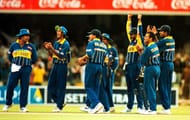
The Sri Lankan team of 1996 turned out to be the dark horse that ended up crossing all hurdles and exceeding expectations to go on to lift the silverware. Leading from the front, skipper Arjuna Ranatunga and magical coach Dave Whatmore strung together a unit of committed individuals who achieved the improbable.
With each player in the squad having a defined role to play, and with no injury scares throughout the tournament, the Lankan lions did not require the services of then youngsters Marvan Atapattu, Upul Chandana and Russell Arnold as Sanath Jayasuriya, Muttiah Muralitharan and Roshan Mahanama respectively fulfilled their assigned roles.
Having said that, off-spinner Chandana was the first choice for twelfth man courtesy his sharp fielding skills, an example of which he gave by running out Robin Smith in the quarter-final against England.
Also Read: Does Sri Lanka deserve to play the 2019 World Cup?
2003
Nathan Bracken and Nathan Hauritz
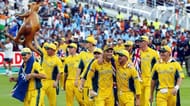
Speaking of the luckiest people to win the World Cup, Australian left-arm pacer Nathan Bracken and off-spinner Nathan Hauritz would rank quite high on that list.
Both these players were not a part of the squad that was selected to represent the Kangaroos in the Rainbow Nation but they found themselves on the plane to South Africa amidst unfortunate circumstances for the Aussie team.
While Hauritz joined the team as a replacement for the wizard of spin Shane Warne, after he was sent home courtesy a ban on being tested positive for a drug, Bracken joined the squad mid-tournament as Jason Gillespie was ruled out after four matches due to an injury.
With an otherwise balanced squad that steamrolled most oppositions en-route their swansong title defence, the two Nathans could only watch their team making history from the sidelines. Bracken, though, did get a chance to contribute to a World Cup win in 2007 where he picked up 16 wickets across 10 matches
Also read – Most matches played in world cup by a player
2007
Mitchell Johnson and Brad Haddin
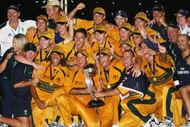
The mighty Aussies dominated not just cricket but also it's marquee quadrennial world event on both sides of the beginning of the millennium. They crushed the three Asian giants in respective finals of 1999, 2003 and 2007.
One of the major reasons for their dominance was the strong outfit they put on the field, virtually making them invincible. This, however, did not help the cause of fringe players as their only way of making the final cut remained an injury to a permanent member of the playing XI.
Left arm pacer Mitchell Johnson was in his formative days in international cricket and he could not force his way through an Australian bowling line up that, though devoid of injured Brett Lee, comprised of the formidable trio of Glenn McGrath, Nathan Bracken and Shaun Tait.
Brad Haddin, on the other hand, was warming the bench as a back up wicket-keeper for man of the final Adam Gilchrist, who never missed a match across his entire career owing to fitness concerns.
Johnson and Haddin thus had to wait for their maiden World Cup appearance till 2011, four years after having already won the world title.
Also Read: Cricketers who performed well in both World Cup as well as Champions Trophy
Follow IPL Auction 2025 Live Updates, News & Biddings at Sportskeeda. Get the fastest updates on Mega-Auction and cricket news
